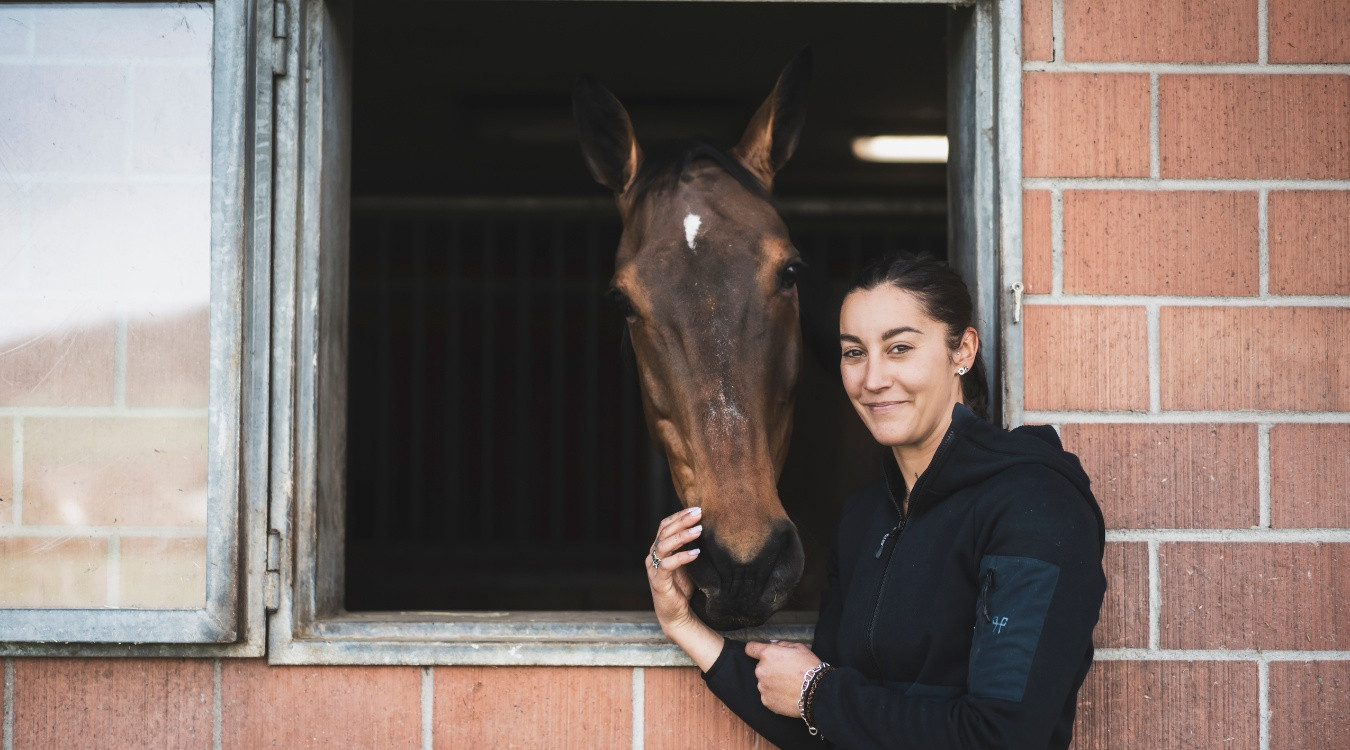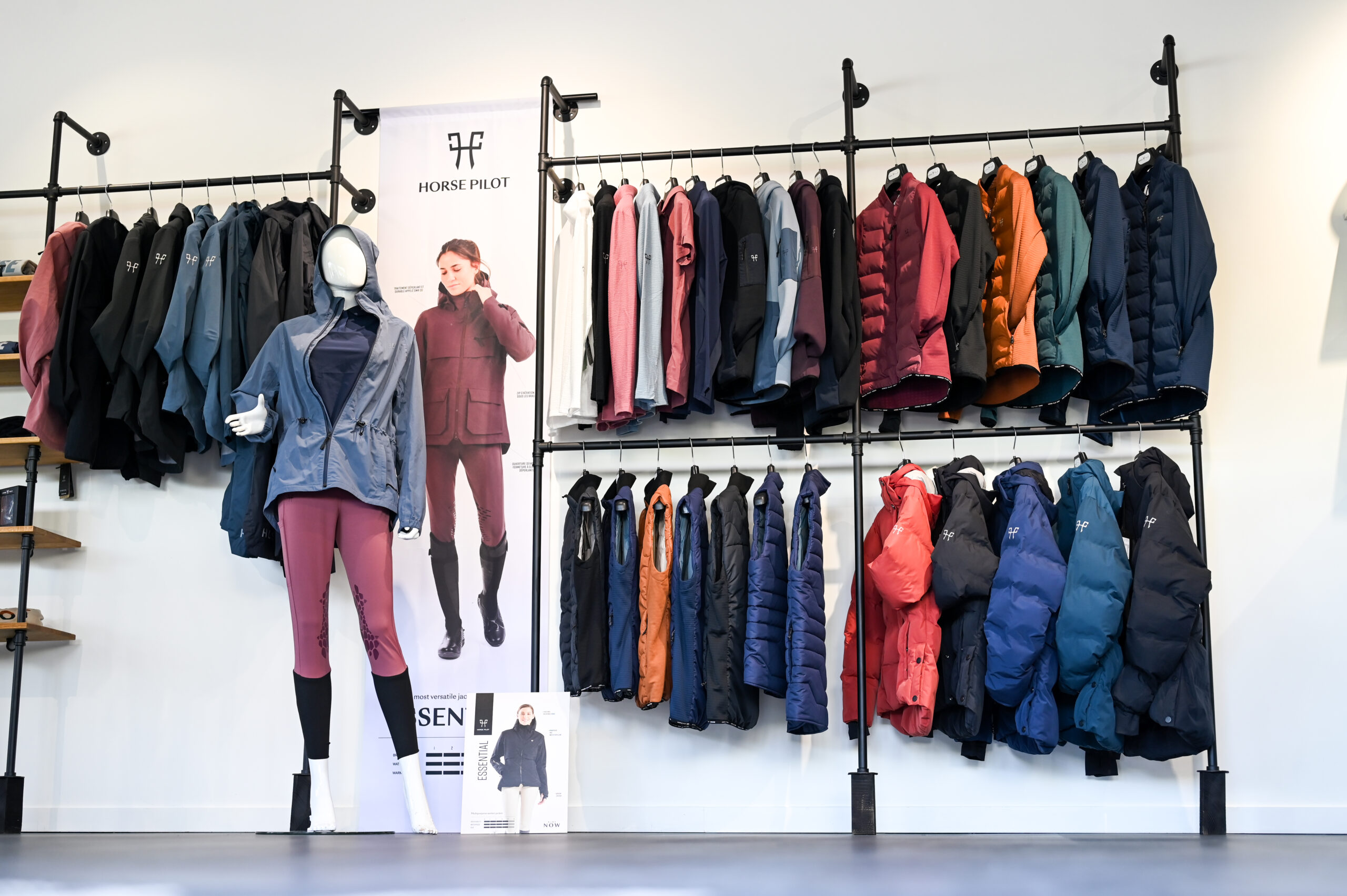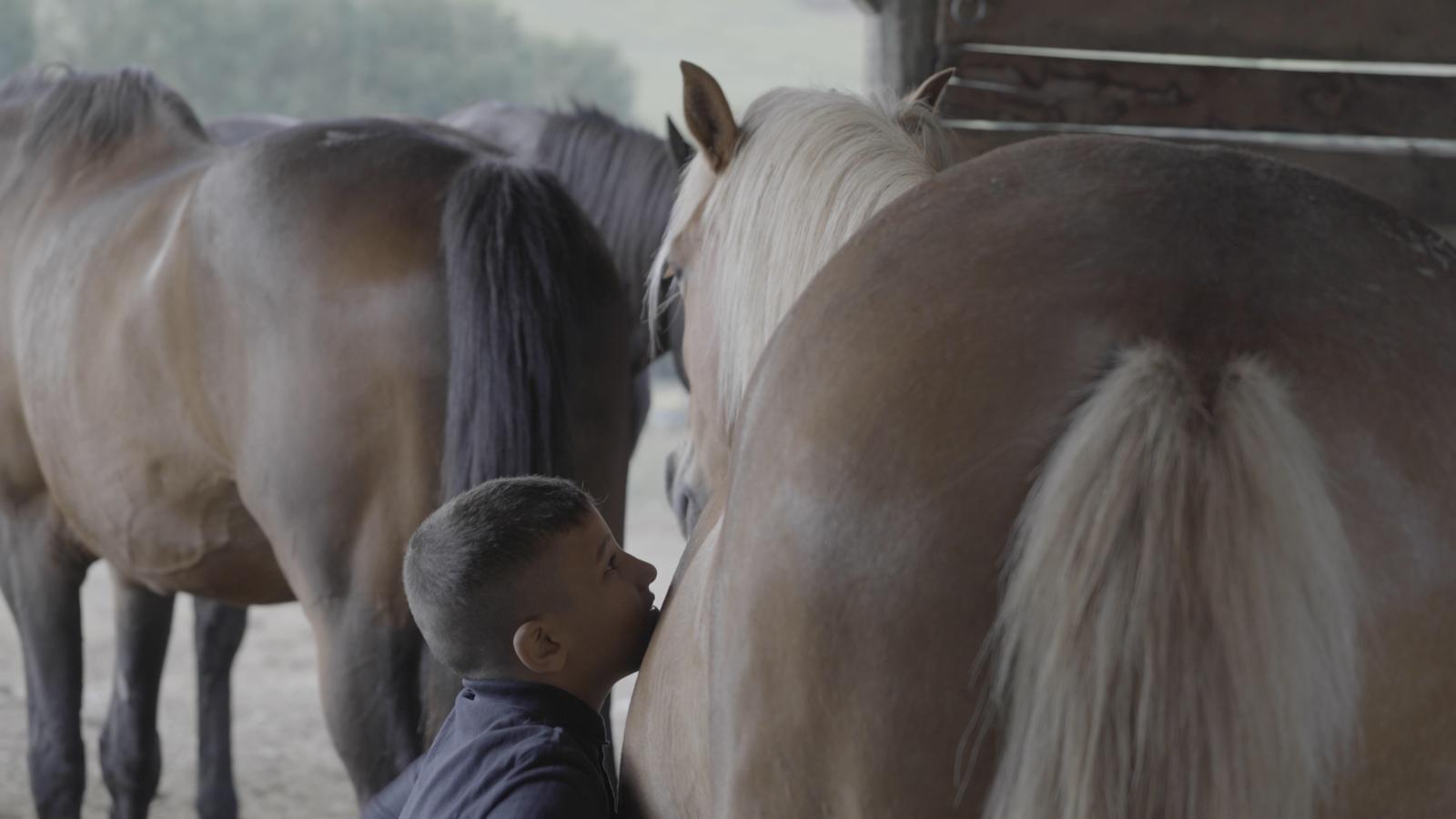
Valentine Hssein has been competition groom for international rider Fanny Skalli for 3 years. When she’s not at the Guerdat stable in Switzerland, Valentine accompanies Fanny on the show grounds, where her role with the horses is fundamental to ensuring that the equine athletes are perfectly available, both physically and mentally. An intense and demanding profession, where passion and versatility are essential, show grooming requires solid technical skills in equine care, but also personal qualities such as organization, flexibility and the ability to work effectively in a team.
Focus on the job of competition groom through the experience of Valentine Hssein.
Valentine Hssein’s presentation
Horse Pilot : Can you tell us about your career path, the people you met and the opportunities you had before finally meeting Fanny?
Valentine Hssein : I started horse-riding at the age of 14, after many years of playing volleyball (a sport also practiced by my parents) and basketball. I’d wanted to ride for a long time and when I started, this passion never left me. After that, I did two years’ training: a year’s CQP (Certificat de Qualification Professionnelle) and a year’s BPJEPS to teach.
After that, my aim was to find a stable to become an in-house rider and improve my riding skills, with a view to taking the DESJEPS to become an instructor 2 or 3 years later. I found a stable in Normandy where I was a house rider for a year and a half, then a competition groom for another year and a half. This last experience was a real revelation and turned all my plans upside down. I suddenly knew what I wanted to do for a living: competition groom. So I stayed in Normandy for 6 years, then 3 years ago I heard that Fanny Skalli was looking for a competition groom, so I took a chance. I wanted to go abroad, so this was a real opportunity for me. I contacted Fanny who offered me a trial period. I went there in the first week of January 2021 and it went really well. So I went back to France, moved all my stuff in and started working for Fanny on February 1, 2021.
HP : What do you like about your job?
V.H. : I love being in constant contact with horses and helping to develop their performance. I’m constantly looking for ways to improve their well-being and comfort on a daily basis, to make them more available. It’s something I really love about my job.
The competition groom’s job
The competition groom’s job: day-to-day
HP : What do you deal with on a daily basis? Nutrition, preparation, maintenance, medical care…
V.H. : I try to manage as many things as possible on a daily basis. The groom is a bit like a Swiss Army knife. In this job, you’re constantly concerned with the physical well-being of the horses, so you have to be very observant. You have to know the horses inside out, so you can spot the slightest anomaly and act as quickly as possible. When I put horses in the truck for competition, I want them to start at 200% of their performance. So I make sure all the boxes are ticked before they set off. I communicate a lot with Fanny and the other members of her team, Gaëlle the in-house groom and Pauline the in-house rider. As soon as there’s any doubt, we work together to find a solution. For example, if we sense that a horse is a little more tired than usual, we all discuss it together, always with the idea in mind that the quicker we act, the better.

As a groom, I also manage the whole feeding process, always in consultation with the team: how are the horses going to eat? What are they going to eat? What do they need to be at their best?
And then there’s the whole administrative part. For example, I have to take care of all the health paperwork and enter the horses’ temperatures into an application 3 days before the competition.
HP : Can you describe a typical day in your life?
V.H. : The day starts at 7 a.m., but I like to arrive earlier to enjoy a moment alone with my horses and give them their hay. We start by taking the horses out and dividing them into lots: some go to the paddock, others to the walker. Then we make the stalls. In the Guerdat stable, everyone participates, whether it’s the competition rider, the in-house riders or the grooms. Then, when it’s over, we bring everyone in, put the water back on and take the horses out to work (lunging, walking, forestry…). We try to get all the horses out in the morning. For the lunch break, we take it in turns to make sure everyone gets a bite to eat. We start again at 2pm, and the afternoon is devoted to grooming. The horses return to the paddock while the stalls are cleaned, the stable tidied and hay put back on. We bring the horses in between 3:30 and 4pm and feed them.
What I like about the Guerdat stable is that the horses are often outside, which is something very important here. Our horses go out 3 to 4 times a day and stay in the stall for 3 or 4 hours maximum during the day.We make sure that their living conditions are as natural as possible. We’re lucky enough to have immediate access to the forest, so we try to take them there as much as possible, at least 2 times a week. We also have plenty of grassy areas for them to work on outside the quarry.
The competition groom’s job : in competition
HP : What changes when you go to a competition? Is managing the horses different? Are there times when you find yourself alone?
V.H. : In competition, we try as much as possible to keep to the same routine as at home. Although there are a few more time constraints to respect the rhythm imposed by the events, we continue to take the horses out as much as possible. A typical day at a competition is therefore very similar to what we do at home: we arrive, we feed, we do the stalls and then we start taking the horses out. From 5 horses upwards, there are two of us to do the job properly and take the horses out as much as possible.
HP : The groom has an essential role to play at high level. How does your work complement Fanny’s?
V.H. : I communicate a lot with Fanny, especially when I’m introducing something new. For example, when I’m testing a new treatment, I ask Fanny if she feels any difference in the way the horse is functioning, whether we should continue with the treatment or try something else. Similarly, if Fanny or I feel that a horse is more tired than usual, we’ll discuss it together so that I can implement the appropriate treatments and she can adapt the work schedule accordingly. If Fanny feels that a horse is getting a little tired of working in the quarry, she’ll talk to me and the rest of the team so that we can take him out into the forest. This bond with Fanny and the team is very important for improving the horses’ comfort and performance.
Working relationship with Fanny Skalli
HP : Unlike other grooms, it’s obvious that you ride a lot. Was this part of the plan or did a relationship of trust develop?
V.H. : No, it wasn’t part of the plan. When I arrived at the Guerdat stable, Fanny was pregnant. She wasn’t there because she was in Marseille. So it was the in-house rider at the time who rode the horses. I only took them into the forest, on Fanny’s instructions.
And then, even before applying, I had fallen in love with Fanny’s mare Jonka. I’d seen her in competition at Deauville a few months before, and I said to myself: “one day, I’ll take this mare on”. I found her incredible. She’s a very atypical mare, who doesn’t let everyone approach her. And I felt right away that there was a good feeling between me and her. I’d never felt that way before. I think that played a big part in the relationship of trust that quickly developed with Fanny. Jonka is Fanny’s lead mare, so when she saw that things were going really well between her and me, she entrusted her to me to ride in the forest. Then Fanny’s father-in-law, who is also her coach, saw me riding and told Fanny that he felt I was capable of moving horses at all three paces. The idea is not to do a lot of work, as I’m not there to train them, but just to move them from time to time.

Animal communication in grooming competition
HP : We know you’ve trained in animal communication. Were you able to learn more by working as a groom at Fanny’s? Does this kind of development contribute to your self-fulfilment and make you want to go further?
V.H. : I discovered animal communication a few years ago. I had some done for Jonka. 2 years ago, Jessica Morin, a friend of Fanny’s who is an equine masseuse, came to massage the horses at a competition in Lyon. She felt that there was a particularly well-developed relationship between the horses and me, and that it would be interesting to develop this bond even further. I really liked this idea, but I wanted to choose the right person to train me. Jessica recommended Fanny Marchal, with whom she had trained herself. So I started the training, which was done remotely over a year, with live video sessions once or twice a month. It was very practical for me. I really enjoyed the course and I’ve been doing regular training ever since. I’m also very keen to learn about energy healing. These are invaluable aids for understanding horses better and acting more quickly in the event of a problem, whether physical or emotional.
Making the difference
HP : Animal communication makes all the difference. What does it bring to your day-to-day management of horses?
V.H. : It’s completely different because it opens a lot of doors to understanding things and taking action. In fact, horses are so intelligent that they know you can help them. So they’re more demonstrative. When you really start observing them, listening to them, you realize that they’re sending you lots of little signals. Animal communication then helps us to take more targeted action. For example, after an effort, it will help me choose the most appropriate treatment (clay, arnica, etc.).
I use animal communication when I’m in doubt about something. I’ll tune in to the horse, ask questions and see if I can get any information that might help me understand. Sometimes, nothing comes out because what we think is a problem isn’t necessarily a problem for the horses. Here again, I work closely with Fanny, and in some cases, animal communication has really helped us.
Using animal communication to help horses
HP : Can you give us an example of a concrete situation?
V.H. : I called on my trainer for one of Fanny’s mares that we couldn’t understand. It was really very complicated. We could feel that she wasn’t feeling well in her body. Thanks to Fanny Marchal, we were able to identify a number of previous problems that were causing the mare to have certain expectations. We changed our way of working with the mare, Fanny on horseback and me on foot. Fanny and I groped our way around a bit before finally finding a way of working that suited the mare better. It took a while, but she’s progressing in the right direction. Animal communication wasn’t the only thing that helped, as Fanny’s horses are also regularly treated by an osteopath, Nicolas Belin. I also have a grounding in equine massage, so as soon as I sense discomfort, I put my hands on the horse to try and relieve any tension. It’s all these treatments put together that have certainly unblocked the situation with this mare.

HP : Everyone wants to be a groom for great riders, but how can you tell the difference?
V.H. : You have to be really passionate about it and be prepared to put your private life on hold for a while. I live 200% for my horses, even when I’m on vacation or resting, I think about them. By necessity, because it requires a major investment, this job takes up a lot of space, and you have to be prepared to accept that.
You also have to be aware that it’s a very hard job, because you work so many hours. So you have to be perseverant and not stop at the first difficulty.
The desire to learn is also very important in this profession. You have to train regularly, be curious and ask questions all the time, and never rest on your laurels. In competition, I like to look at what’s being done elsewhere. I walk around the stalls and ask questions when I see someone doing a particular treatment. I’m also lucky enough to be in frequent contact with Emma, Steve Guerdat’s groom for the last 10 years, who has a wealth of experience.
Last but not least, competition grooms need to know their horses inside out. He needs to observe them closely, so he can act quickly, drawing on all the care he has learned to provide.
To make the difference, I’d say you need to accumulate as much experience as possible. It’s thanks to this experience that you’re able to take the right initiatives at the right time, and ultimately, that you become capable of managing a great rider’s horse. These are very valuable horses, for which the level of work demanded is very high. So you have to be particularly meticulous in your care. I’ve worked very hard to get where I am today, and I’m proud to be entrusted with this responsibility.
A final word
HP : How do you see your future?
V.H. : I know that my future will be with horses. I love what I’m doing at the moment. I really enjoy being in competition because it’s an intense rhythm, far from routine. I’m lucky enough to be able to look after some very good horses and I can’t see myself doing anything else at the moment. So I hope to go as far as I can in this direction.
At the same time, I’m going to continue training in animal communication, energy care and massage. I’m very attracted to these fields. I know I could go into these professions if one day I feel the need to give up. But for the moment, I feel at home.
—
Photo credits : Stéphane Cande


